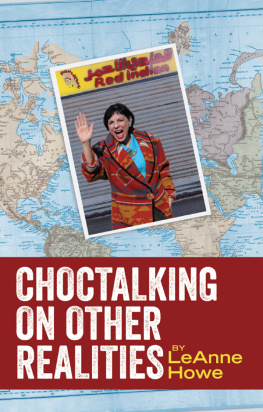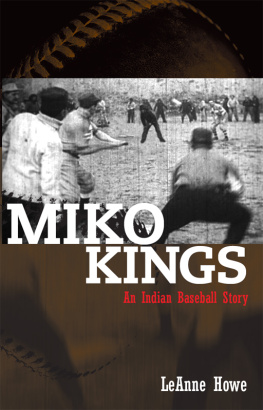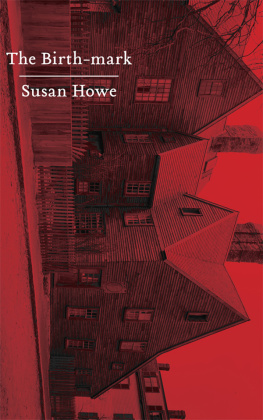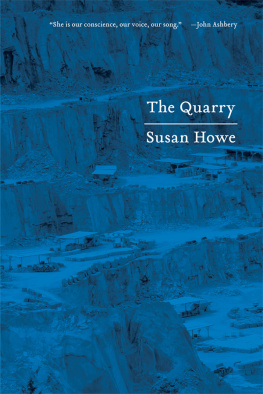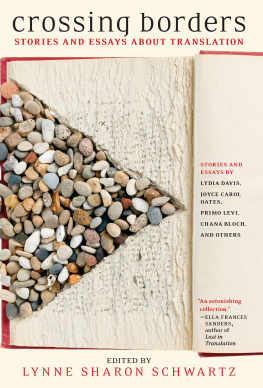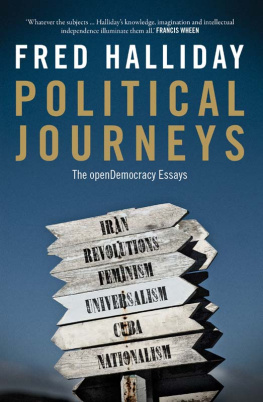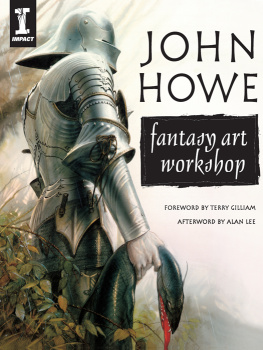LeAnne Howe - Choctalking on Other Realities
Here you can read online LeAnne Howe - Choctalking on Other Realities full text of the book (entire story) in english for free. Download pdf and epub, get meaning, cover and reviews about this ebook. year: 2013, publisher: Aunt Lute Books, genre: Art. Description of the work, (preface) as well as reviews are available. Best literature library LitArk.com created for fans of good reading and offers a wide selection of genres:
Romance novel
Science fiction
Adventure
Detective
Science
History
Home and family
Prose
Art
Politics
Computer
Non-fiction
Religion
Business
Children
Humor
Choose a favorite category and find really read worthwhile books. Enjoy immersion in the world of imagination, feel the emotions of the characters or learn something new for yourself, make an fascinating discovery.
- Book:Choctalking on Other Realities
- Author:
- Publisher:Aunt Lute Books
- Genre:
- Year:2013
- Rating:4 / 5
- Favourites:Add to favourites
- Your mark:
Choctalking on Other Realities: summary, description and annotation
We offer to read an annotation, description, summary or preface (depends on what the author of the book "Choctalking on Other Realities" wrote himself). If you haven't found the necessary information about the book — write in the comments, we will try to find it.
The collected stories/essays in Choctalking on Other Realities, by Choctaw author LeAnne Howe, depict, with wry humor, the contradictions and absurdities that transpire in a life lived crossing cultures and borders. The result is three parts memoir, one part absurdist fiction, and one part marvelous realism. The collection begins with Howes stint working in the bond business for a Wall Street firm as the only American Indian woman (and out Democrat) in the company, then chronicles her subsequent travels, invited as an American Indian representative and guest speaker, to indigenous gatherings and academic panels in Jordan, Jerusalem, Romania, and Japan.
Most importantly, the stories are framed by two theoretical essays on what Howe has named tribalography. Here she explores the complex way memories travel in generations of Native storytellers, which culminates in an original literary contribution in how to read indigenous stories. In his foreword, prominent Native American scholar Dean Raderbesides comparing Howes humor to fellow Oklahomian Will Rogerswrites, I believe it [tribalography] is the most significant theory of American Indigenous writing to emerge in the last 20 yearsmaybe ever... It bridges the gaps between the most significant approaches to American Indian Studiesnationalism, sovereignty, issues of land and place, history, and culture.
Choctalking is LeAnne Howe at her very best. Who else can mix hard-hitting social commentary with wicked wit and good old fashioned storytelling? Howe is a true citizen of the world and the relative at the party who cant stop telling the truth. This is a book that belongs in classrooms and book clubs, too. Everyone should read this book. Everyone.Tayari Jones, author of Silver Sparrow
LeAnne Howe is a mound builder of story. Like earthworks that gather far-flung nations and connect worlds above and below, these exquisite tales of travel and cross-cultural encounter align across geographies and generations, across embodied research and archival adventure, across wry humor and speculative analysis to reveal unexpected pattern, relationship, theory. What emerges is sophisticated and complex, engineered not simply to endure but to spark future performance, to provoke story building of the readers own.Chadwick Allen, Author of Trans-Indigenous: Methodologies for Global Native Literary Studies
This collection of LeAnne Howes demonstrates the power, compassion, and at times riotous American Indian humor of a master storyteller. With a deep commitment to Southeastern American Indian perspectives on tribalography and tradition, Choctalking on Other Realities spans indigenous worlds from New Orleans to Amman, Jordan. The words throughout these pages illuminate deeper histories of embodied indigenous knowledges, and tribal practices. With Howe as a guide, readers are invited to confront the global ironies of Indianness with wisdom, laughter, and grace.Jodi A. Byrd, author of The Transit of Empire: Indigenous Critiques of Colonialism
...In this extraordinary collection, LeAnne Howe does for Choctaw storytelling what The Hunger Games does for archerymakes something seemingly traditional and archaic feel edgy, new, and necessary.from the Foreword by Dean Rader, author of Engaged Resistance:American Indian Art, Literature and Film
LeAnne Howe: author's other books
Who wrote Choctalking on Other Realities? Find out the surname, the name of the author of the book and a list of all author's works by series.

